As concert venues go, this one is perfect – a barn-like structure, whose pine timbers emit a fragrance not unlike that of a sauna, whose long glass windows look out across oxon-red wooden Swedish farmsteads and the frozen expanse of Lake Orsasjön. The Vattnäs Konsertlada is the labour of love of local girl, the international opera singer Pers Anna Larsson, and is being used at Sweden's by now best-known music festival, Vinterfest, for the first time.
Guests are streaming into the barn, stepping on pine branches strewn across the entrance to stop them sliding on the ice. Meanwhile the artists for the lunchtime concert, whose eclectic offerings range from Ophelia's madness scene from Ambroise Thomas' 1868 Hamlet to Robert Schumann's Piano Quartet in E flat major, have taken pre-concert refuge down the road in this hamlet in central Sweden. To let them warm up, local silversmith Bernd Janusch has given them use of his artist's studio, his bedroom and the baby grand in his living room.
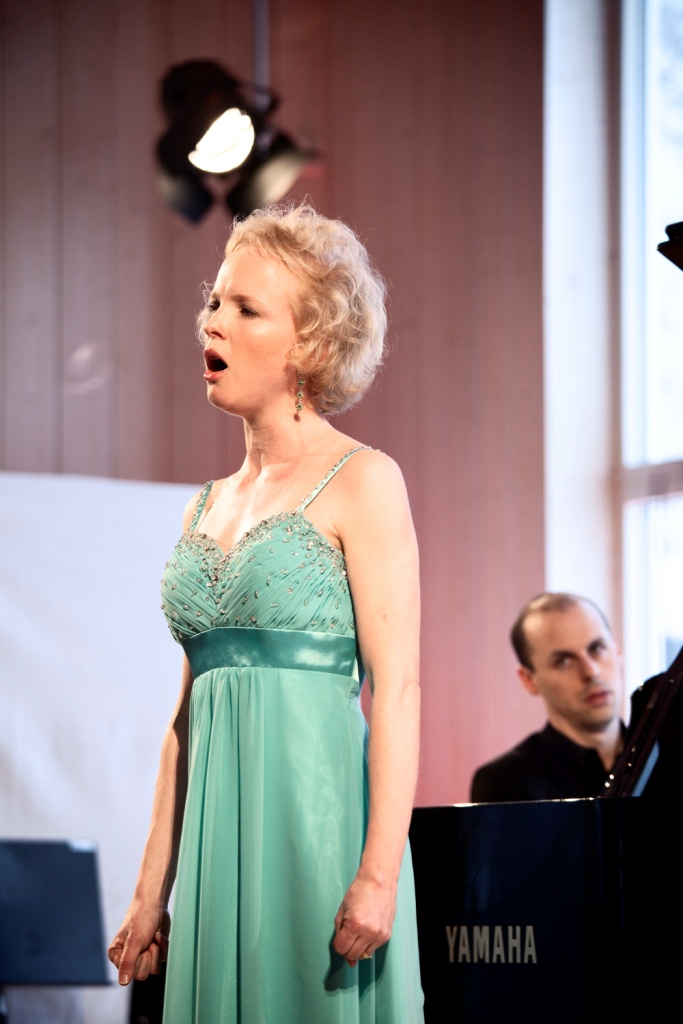 Kerstin Avemo (pictured right), the Swedish soprano probably best known for her portrayal of Lucia in Lucia di Lammermoor at the Gothenburg Opera last year, about which critics raved, is the first to arrive in the Konsertlada. She does so in a car whose winter tyres grip the icy sloped road between Janusch's cosy blue-and-white bungalow and the barn. If she possessed any diva-like qualities she has been forced to leave them at the door along with her fur-trimmed winter coat and knee-high snow boots which she replaces with a pair of dainty pale pink heels, sniggering along with the audience as she slips them on before taking up her position on the stage.
Kerstin Avemo (pictured right), the Swedish soprano probably best known for her portrayal of Lucia in Lucia di Lammermoor at the Gothenburg Opera last year, about which critics raved, is the first to arrive in the Konsertlada. She does so in a car whose winter tyres grip the icy sloped road between Janusch's cosy blue-and-white bungalow and the barn. If she possessed any diva-like qualities she has been forced to leave them at the door along with her fur-trimmed winter coat and knee-high snow boots which she replaces with a pair of dainty pale pink heels, sniggering along with the audience as she slips them on before taking up her position on the stage.
Welcome to Vinterfest, the chamber music festival. It bears the hallmarks of the hands-on approach of its artistic director, the aptly-named,Martin Fröst, one of the world's leading clarinettists, who has personally scouted the local area in search of venues in the region's villages. Past haunts have even included a local MOT service centre, old cinemas and a DIY store. This year's venues are slightly more conventional – wooden churches, a gym, a local museum - but geographically diverse, offering concert-goers the chance to visit parts of the Swedish countryside in the central province of Dalarna to which they might never otherwise have been drawn. Careful attention has been paid to the aesthetics of this musical marathon – ice sculptures flank venue entrances and candle-lit alcoves have been carved out of the snow to light the approaching pathways. On a more pragmatic note, boot scrapers aplenty are also available.
Be prepared to remove your boots during a performance to allow your socks to dry between cross-country skiing jaunts through the surrounding forests
Vinterfest visitors are urged to bring something of an intrepid nature with them. This, after all, is the dead of winter, when temperatures can plummet to as low as minus 30 degrees celsius. Getting here involves a three-and-a-half hour train journey from Stockholm's Arlanda airport, a breathtaking trip comparable in its beauty with the coastal hop between Berwick-upon-Tweed and Edinburgh, which takes in the deep-red wooden houses typical of the region (so coloured by a weather protection paint produced from deposits from the copper industry), a snow-dusted landscape, icy lakes, towering frozen pines and bear and elk forests. Here you can find an old-worldliness that it is easy to think had long been lost in Europe, helped by local specialities such as the small wooden Dala horse – the national symbol – and thick blueberry soup - said to be good for hardening the muscles and a favourite amongst the winter sports folk. Musicians, festival visitors and cross-country skiers alike consider it normal to already start indulging in it at breakfast time.
Forget the idea of sartorial elegance. Pack instead the warmest of thermals, and be prepared, as this festival-goer did, to remove your boots during a performance to allow your socks to dry between cross-country skiing jaunts through the surrounding forests or ice-skating guides across lakes, which can be sandwiched between the concerts of this tight-packed schedule. Nobody will mind.
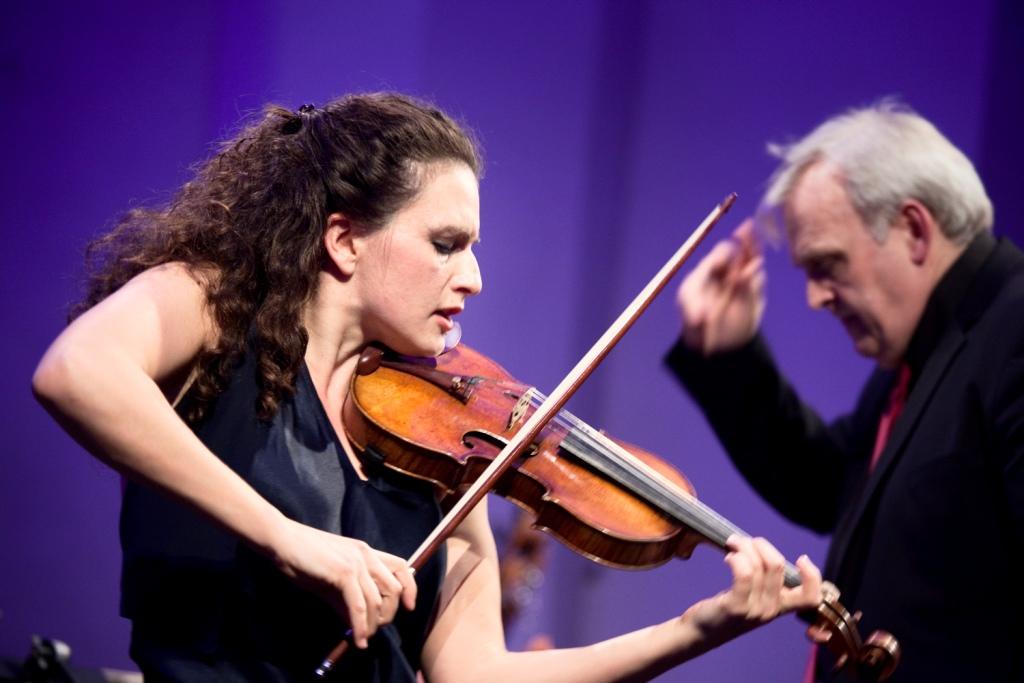 About 24 hours after the barn debut, we're sitting in the church in Sattungbyn, Orsa, the sky is clear blue, the wind biting. Several concert-goers have left their "sparks" - the local sledge consisting of a chair on a pair of metal runners which is propelled along by the user kicking the ground: spark means kick – at the church door.
About 24 hours after the barn debut, we're sitting in the church in Sattungbyn, Orsa, the sky is clear blue, the wind biting. Several concert-goers have left their "sparks" - the local sledge consisting of a chair on a pair of metal runners which is propelled along by the user kicking the ground: spark means kick – at the church door.
Inside against the backdrop of a beautiful triptych wood-cut altar, Dutch violinist Liza Ferschtman (pictured above left) and Berlin-based French pianist Julien Quentin deliver a gritty performance of the Kreutzer Sonata. Actor Björn Granath recites a newly adapted version of Strindberg's Inferno accompanied by the Stockholm Chamber Brass in an ambitious piece written Britta Bystrom. It encompasses several of the obsessions which define much of Strindberg's works, including neuroticism and paranoia. It doesn't get much more Swedish than this.
On the journey back to Mora Martin Fröst, who has just flown in from a concert in Japan, explains why the fest, now in its seventh year, is so important to him even though he could easily choose to spend his time elsewhere in the best concert halls in the world. Instead he devotes a considerable amount of his energy to an event set, as he puts it himself, not just “in the middle of nowhere” but “in the dead of winter”.
“This place does not have much of a cultural life, and so lots of people didn't believe [Vinterfestl] would work, but the opposite proved to be the case, and one of the central reasons for this is that I have the local people on my side. And when you have your own festival you feel it's one of the most important things you do. You create something longer-lasting than most music events which are otherwise so often just in the here and now. Whereas what we're doing with Vinterfest is something that can be developed and grown – it's like a cocktail party, a really human meeting.”
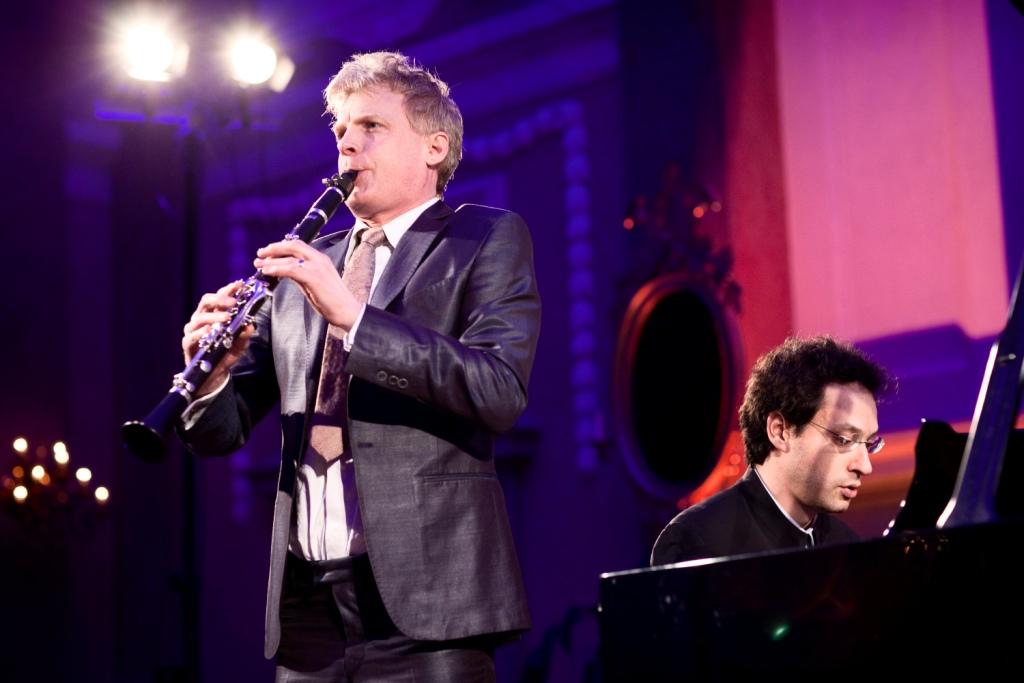 He also uses the cocktail party metaphor at Fröst and Friends (pictured right, Fröst with Shai Wosner on piano), a classical jam session at which the audience enjoys a candle-lit dinner, which has become the audience's favourite event at Vinterfest. It opened this year with Avemo and Fröst performing Eden Ahbez's Nature Boy, with Avemo, the daintiest opera singer I've ever come across, protesting on stage: “But Martin, it'll be a catastrophe!” An hour earlier we'd heard her in the Mora Church bring the house down with Lucia's madness scene, which elicited standing ovations and cries of “fantastisk”. Now here she was, sorbet-pink ball-gown replaced by a silver cardigan and black skirt, the opera singer turned night-club jazz crooner rising to a very different occasion and to Fröst's haunting accompaniment which he delivered with a delicate gyration of his entire torso. The effect was breathtaking.
He also uses the cocktail party metaphor at Fröst and Friends (pictured right, Fröst with Shai Wosner on piano), a classical jam session at which the audience enjoys a candle-lit dinner, which has become the audience's favourite event at Vinterfest. It opened this year with Avemo and Fröst performing Eden Ahbez's Nature Boy, with Avemo, the daintiest opera singer I've ever come across, protesting on stage: “But Martin, it'll be a catastrophe!” An hour earlier we'd heard her in the Mora Church bring the house down with Lucia's madness scene, which elicited standing ovations and cries of “fantastisk”. Now here she was, sorbet-pink ball-gown replaced by a silver cardigan and black skirt, the opera singer turned night-club jazz crooner rising to a very different occasion and to Fröst's haunting accompaniment which he delivered with a delicate gyration of his entire torso. The effect was breathtaking.
Fröst is determined to ensure his festival is as much an expression of its participants' preferences as of his own. So alongside such classics as Mozart's clarinet quintet, which firm Fröst fans are not likely to let him get away without performing (“playing Mozart is your life as a clarinettist,” he tells me, “you always come back to it”), are far rarer works, such as a duo for violin and cello by Erwin Schulhoff, performed by Liza Ferschtmann and cellist Thorleif Thedeen, or Francois-Joseph Gossec's String Quartet in A Major, played by the young and charmingly melancholic but energetic Polish ensemble, Appollon Musagete Quartett (pictured below).
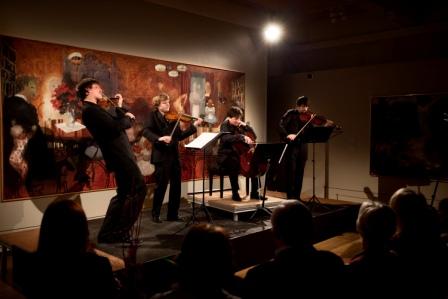 They surprise and delight on numerous occasions over the four days, particularly with their concluding number at the opening concert in the museum dedicated to local golden boy, Sweden's foremost artist, Anders Zorn. Stravinsky's Tango is a good piece to have up your sleeve for an encore, and cellist Piotr Skweres in particular charmed the audience by giving the impression that his eyebrows were about to take off as he played.
They surprise and delight on numerous occasions over the four days, particularly with their concluding number at the opening concert in the museum dedicated to local golden boy, Sweden's foremost artist, Anders Zorn. Stravinsky's Tango is a good piece to have up your sleeve for an encore, and cellist Piotr Skweres in particular charmed the audience by giving the impression that his eyebrows were about to take off as he played.
If you need a break from the chamber music – I indulged in nine concerts in four days – there are plenty of escapes. You can do a little light skiing on the route of the world's longest cross-country skiing race, the 90km Vasaloppet which takes place with 16,000 competitors just a couple of weeks after Vinterfest, or a spot of skating on one of many surrounding lakes, followed by a dinner of braised bear steak or fried elk cheek washed down with a glass of aquavit.
Next year's festival looks equally likely to thrill, with a line-up to include Martin Fröst, Anne Sofie von Otter, pianist Leif Ove Andsnes, and violinist Alina Pogostkina. Just don't forget your snow boots and merino wool thermals.

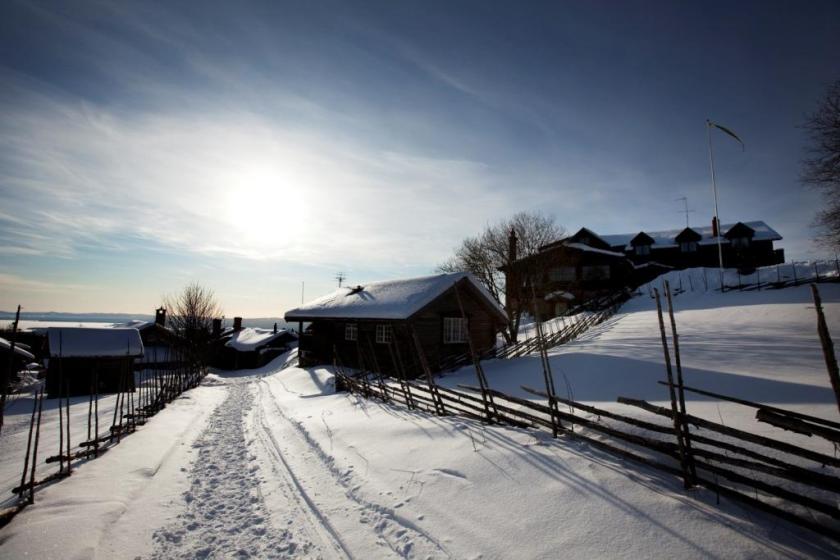












Add comment